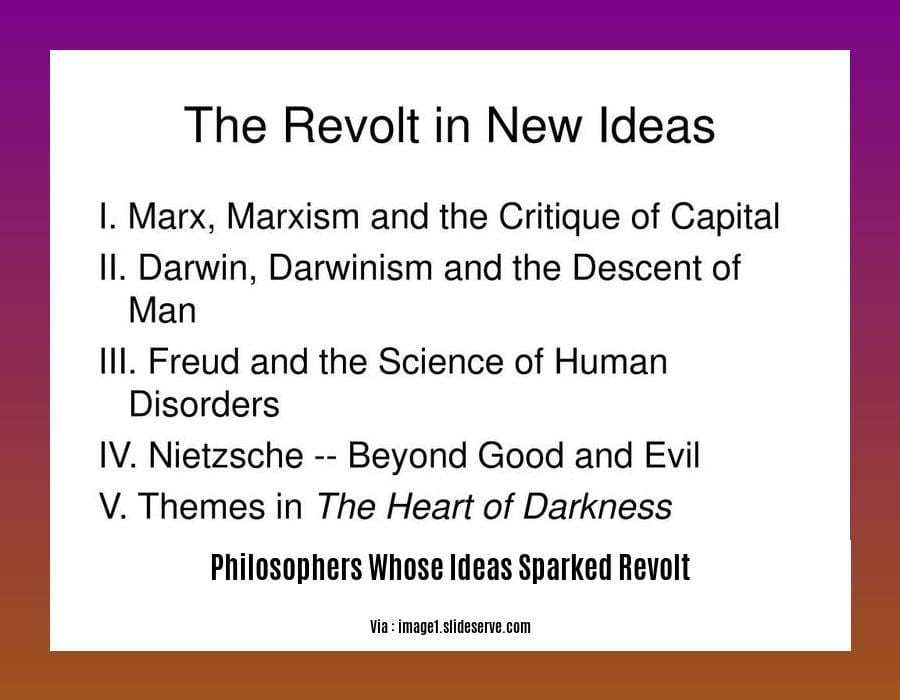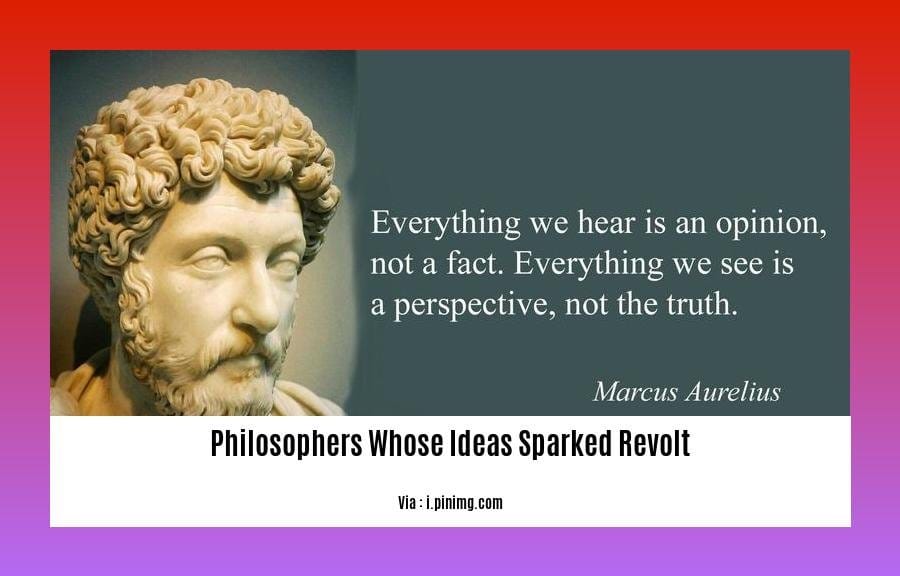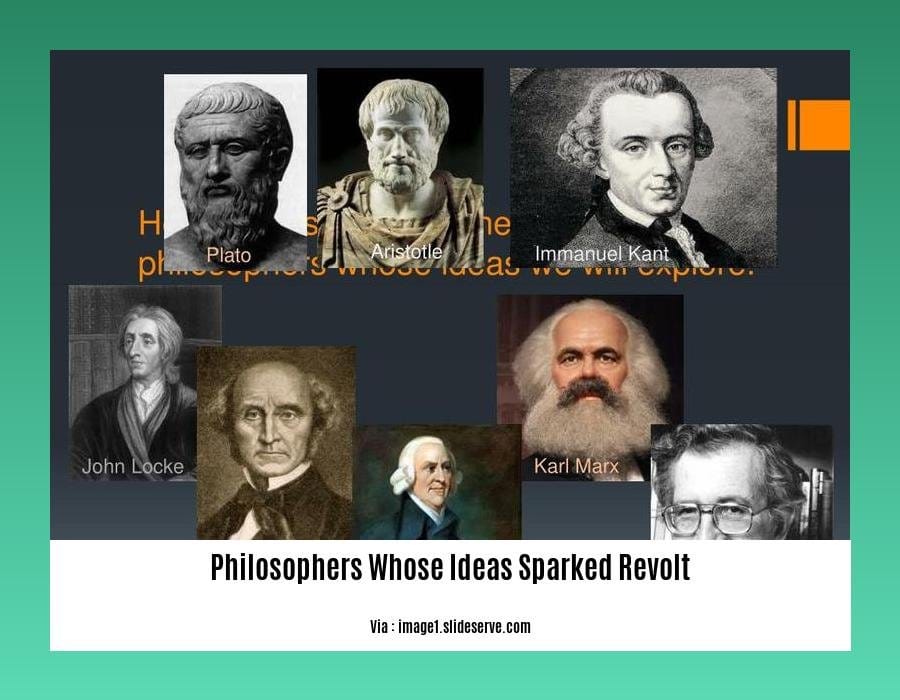**[1. Philosophers Whose Ideas Sparked Revolts]** The impact of ideas on the course of human history cannot be understated. Throughout history, philosophers have played a pivotal role in shaping the way we think about the world and our place in it. Their ideas have inspired revolutions, transformed societies, and continue to influence our lives today. This article explores the lives and works of some of the most influential philosophers whose ideas sparked revolts and ignited transformative movements.
Key Takeaways:

- Five influential Enlightenment philosophers include John Locke, Jean-Jacques Rousseau, Adam Smith, Immanuel Kant, and Thomas Paine.
- John Locke emphasized natural rights, including liberty and property.
- Jean-Jacques Rousseau advocated for a more just and fair society.
- Adam Smith, the father of modern economics, believed in free markets.
- Immanuel Kant emphasized the importance of reason in philosophy.
- Thomas Paine advocated for revolution against unjust governments.
Philosophers Whose Ideas Sparked Revolt
From Plato’s allegory of the cave to Marx’s class struggle, philosophers have always been at the forefront of social change. Their ideas have inspired revolutions, challenged the status quo, and ignited movements for justice.
John Locke (1632-1704): Locke argued that all individuals possess natural rights, including the right to life, liberty, and property. His ideas were hugely influential in the American Revolution and the French Revolution.
Jean-Jacques Rousseau (1712-1778): Rousseau believed that legitimate government is based on the consent of the governed. This idea became a rallying cry for revolutionaries seeking to overthrow oppressive regimes.
Karl Marx (1818-1883): Marx argued that capitalism is inherently exploitative and will inevitably lead to class conflict. His ideas inspired numerous socialist and communist revolutions.
Friedrich Nietzsche (1844-1900): Nietzsche’s philosophy of self-overcoming and the “will to power” inspired both fascist and Nazi movements.
Mohandas Gandhi (1869-1948): Gandhi developed the philosophy of nonviolent resistance, which was instrumental in India’s independence movement.
These are just a few examples of the many philosophers whose ideas sparked revolt. Their legacy continues to inspire people around the world to fight for justice and equality.
Discover a league of revolutionary thinkers who challenged the status quo and shook the foundations of established beliefs. Their bold ideas and innovative perspectives continue to inspire generations of non-conformists.
Explore the lives of revolutionary intellectuals who questioned norms, who dared to challenge conventional wisdom and push the boundaries of human knowledge. Their groundbreaking theories and thought-provoking writings continue to shape our understanding of the world.
Get to know the contrarian revolutionary philosophers who dared to think differently and offer alternative perspectives on society, politics, and human nature. Their radical ideas continue to provoke thought and challenge the established order.
Karl Marx (1818-1883): Analysis of capitalism and class struggle
Karl Marx, a German philosopher, economist, and sociologist, profoundly impacted our understanding of society and economics. His critique of capitalism and the theory of class struggle remain influential in political discourse today.
Marx’s key ideas include:
- Class struggle: Workers (proletariat) and owners (bourgeoisie) are locked in an inevitable conflict over the means of production.
- Alienation: Capitalism alienates workers from their labor, the products of their labor, and their fellow human beings.
- Exploitation: Capitalists exploit workers by paying them less than the value of their labor, leading to the accumulation of wealth in the hands of the few.
- Revolution: Marx believed that capitalism would ultimately lead to its own downfall through revolution, paving the way for a socialist society.
Key Takeaways:
- Marx’s analysis of capitalism highlighted the inherent contradictions and tensions within the system.
- His theory of class struggle provided a framework for understanding social and economic inequality.
- Marx’s ideas continue to shape political and economic thought, inspiring movements for social justice and economic equality.
Citation:
- Stanford Encyclopedia of Philosophy: Karl Marx
Friedrich Nietzsche (1844-1900): Philosophy of Self-Overcoming and the “Will to Power”
Friedrich Nietzsche was a German philosopher who radically challenged conventional morality and values. His ideas have significantly influenced intellectual thought, particularly existentialism and postmodernism.
Key Concepts:
- The Will to Power: Nietzsche believed that the fundamental drive of human nature is the will to power—a relentless striving for growth, self-assertion, and dominance.
- Self-Overcoming: Nietzsche advocated for overcoming one’s limitations and embracing the idea of becoming the person you are meant to be, constantly striving for self-improvement and transcendence.
- Critique of Christianity: Nietzsche vehemently criticized Christianity for its meekness and otherworldly focus, arguing that it weakened the human spirit and inhibited the pursuit of true power and vitality.
Legacy and Impact:
Nietzsche’s work had a profound impact on the rise of fascism and Nazism in the early 20th century. His ideas of self-overcoming and the “will to power” resonated with totalitarian regimes seeking to cultivate a sense of national superiority and justify aggressive expansionism. However, it’s important to note that Nietzsche’s ideas have also been widely misinterpreted and misused.
Key Takeaways:
- Nietzsche’s “will to power” emphasizes the innate human drive for growth and influence.
- Self-overcoming challenges the notion of complacency and encourages personal transformation.
- Nietzsche’s critique of Christianity aimed at promoting vitality and strength rather than passivity.
Most Relevant URL Source:
Mohandas Gandhi (1869-1948): Philosophy of Nonviolent Resistance
Mohandas Gandhi’s legacy extends beyond India’s independence. His philosophy of nonviolent resistance, known as Satyagraha, inspired countless movements worldwide.
Satyagraha’s Roots:
- Grounded in ancient Indian traditions, including ahimsa (nonviolence) and dharma (righteousness).
- Emphasizes self-purification, truth-seeking, and non-cooperation with injustice.
Key Principles:
- Nonviolence: Unwavering commitment to resolving conflicts without violence.
- Civil Disobedience: Nonviolent refusal to obey unjust laws or actions.
- Truth Force: Belief in the power of truth and moral persuasion.
Impact on India’s Independence:
- Gandhi led India’s independence movement through nonviolent protests and civil disobedience.
- His philosophy inspired millions and weakened British rule.
- India gained independence in 1947 using Gandhi’s principles.
Legacy of Nonviolence:
- Satyagraha continues to inspire social and political movements worldwide.
- Used in struggles for civil rights, environmental protection, and anti-war activism.
- Gandhi’s teachings remain a powerful reminder of the transformative power of nonviolence.
Key Takeaways:
- Mohandas Gandhi developed the philosophy of nonviolent resistance, known as Satyagraha.
- Satyagraha is rooted in Indian traditions and emphasizes nonviolence, civil disobedience, and truth force.
- Gandhi’s philosophy played a pivotal role in India’s independence movement.
- Satyagraha remains a powerful tool for social and political change worldwide.
Citation:
Gandhi, Mohandas Karamchand (1869–1948). (2023). In The Wiley Online Library. Wiley.

FAQ
Q1: Who were the five most influential Enlightenment thinkers, and what were their key ideas?
Q2: How did Karl Marx’s analysis of capitalism influence revolutionary movements?
Q3: How did Friedrich Nietzsche’s criticisms of traditional morality and values contribute to philosophical movements such as existentialism?
Q4: What is the significance of Mahatma Gandhi’s philosophy of nonviolence, and how did it contribute to India’s independence?
Q5: How have the ideas of philosophers throughout history sparked revolts and shaped the course of human civilization?
- Unlock Water’s Symbolism: A Cross-Cultural Exploration - April 20, 2025
- Identify Black and White Snakes: Venomous or Harmless? - April 20, 2025
- Unlocking Potential: Origins High School’s NYC Story - April 20, 2025















